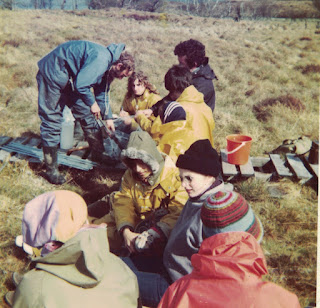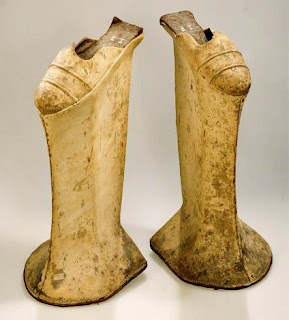 I know what baby boomers are. I'm less clear about all the new lettered generations and Millennials. Who are they? And who cares? Not us baby boomers. Everyone else is just a prequel or an afterthought. We're the ones who count, which is why we find it so baffling that we're dropping dead.
I know what baby boomers are. I'm less clear about all the new lettered generations and Millennials. Who are they? And who cares? Not us baby boomers. Everyone else is just a prequel or an afterthought. We're the ones who count, which is why we find it so baffling that we're dropping dead.But I got to wondering about all the names we give our generations, and time periods in general, and it occurred to me to look into the historical record. Here's the thing about me and History. I don't know any. If I ever did, I've forgotten it. And that's a problem, because those who forget history are doomed to repeat it.
Not that I'll be able to tell.
 Anyway, I'm not at all certain what or when the Middle Ages were. Or the Dark Ages. Or Medieval times. So I looked them up.
Anyway, I'm not at all certain what or when the Middle Ages were. Or the Dark Ages. Or Medieval times. So I looked them up.Guess what? They're all the same thing! The Middle Ages started in 476 CE when the Roman Empire fell, with what I assume was a freakishly specific thud. See, I didn't even know the Roman Empire fell all at once. I assumed it sort of dwindled away; everyone misplaced their sandals and the gladiators started doing lunch instead of fighting and the paper boy quit even trying to hit the porch. Turns out it fell, like, on a Tuesday.
By the way, that CE thing? That's what we used to call AD, Anno Domini. Most scholars nowadays prefer to take the religion out of the time references, so Year Of Our Lord is out the window, and Before Christ is out the window, and we have Common Era (CE) and Before Common Era (BCE) instead, although, coincidentally, they are still divided by one particular year when somebody was born under a great star. But it could've been anybody, I guess.
 So the Middle Ages began in 476 CE, and ended with the Renaissance. The Middle Ages were when everyone forgot how to make concrete and we were overrun by Christians and people threw their poop out the windows. There was a whopper of a plague that took out a third of everybody and, times being what they were, was generally blamed on sinfulness rather than fleas. People started beating themselves and each other up to atone for it all, and even engaged in wanton murder of those suspected of insufficient piety. For your garden variety heretic, the Renaissance couldn't come soon enough.
So the Middle Ages began in 476 CE, and ended with the Renaissance. The Middle Ages were when everyone forgot how to make concrete and we were overrun by Christians and people threw their poop out the windows. There was a whopper of a plague that took out a third of everybody and, times being what they were, was generally blamed on sinfulness rather than fleas. People started beating themselves and each other up to atone for it all, and even engaged in wanton murder of those suspected of insufficient piety. For your garden variety heretic, the Renaissance couldn't come soon enough. Actually there was a ton of cool science and math going on during the Middle Ages, but it was going on in Muslim countries, so the Europeans wore red crosses on their sweaters and had themselves a Crusade. They thought if they could murder enough people they would be assured a spot in heaven. They fought Muslims for, like, 300 years, nobody particularly won, and lots of people died, although, in fairness, they would have by now anyway.
Actually there was a ton of cool science and math going on during the Middle Ages, but it was going on in Muslim countries, so the Europeans wore red crosses on their sweaters and had themselves a Crusade. They thought if they could murder enough people they would be assured a spot in heaven. They fought Muslims for, like, 300 years, nobody particularly won, and lots of people died, although, in fairness, they would have by now anyway.Meanwhile, back in Europe, for the entirety of the Middle Ages, nobody clever or important was born, except for Hildegarde von Bingen, who didn't count, for ovarious reasons.
It's the Renaissance folks who named the Middle Ages: some dull, middle interval between the great Greek and Roman civilizations and their own enlightened selves. It's a bit dismissive. And now the Middle Ages have been further subdivided into Early, Late, and Right Spang In The. It was dull. Many of the participants weren't even aware they were in the Middle Ages at the time. So you see the level of sophistication we have to work with.
Those ancient Greeks themselves thought there were five Ages Of Man: Gold, Silver, Bronze, Iron, and Leatherette. All of those people BCE had to figure something was up as they were running out of years, but when they got to zero, lo, time miraculously started up again.
 Anyway, now we're naming generations hand over fist because we don't have time for ages anymore. We've got your Greatest Generation, also known as the Dark Ages because it didn't have any boomers in it; we've got boomers, yay boomers; we've got Generation X, named after what needed to be solved for; then we have Generation Y, which is the same thing as Millennials by the way, and now, ominously, we've got Generation Z, and no more alphabet. It's all winding down, folks.
Anyway, now we're naming generations hand over fist because we don't have time for ages anymore. We've got your Greatest Generation, also known as the Dark Ages because it didn't have any boomers in it; we've got boomers, yay boomers; we've got Generation X, named after what needed to be solved for; then we have Generation Y, which is the same thing as Millennials by the way, and now, ominously, we've got Generation Z, and no more alphabet. It's all winding down, folks.





























































